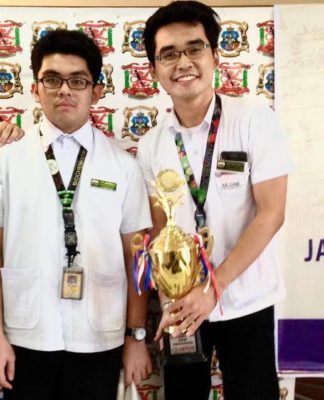A NEED to “rethink and re-present our own” beliefs, in order to understand others, arises from the various cultures and religions of different countries, a philosophical theologian said before an international philosophy congress hosted by the University from May 23 to 26.
During the three-day conference Thomism and Asian Cultures: Celebrating 400 Years of Dialogue Across Civilizations, held at the Medicine Auditorium, Canadian professor William Sweet underscored the need to establish an “intercultural philosophy” that will ultimately “generate a shared, fruitful discussion granting equal rights to all.”
Intercultural philosophy is defined as “the endeavor to give expression to the many often marginalized voices of philosophy in their respective cultural contexts.”
“Pursuing an intercultural philosophy leads us to investigate other cultures and traditions that may also force us to rethink and re-present our own,” said Sweet, who presented his study “Faith and Reason and Intercultural Philosophy” during the congress’ World Union on Catholic Philosophical Societies Forum last May 25.
The union’s current president also said that it was specifically necessary for Catholic communities to seek common ground to rediscover themselves—a feat that can be possible with innovations in communication.
“Despite the differences in approaches to philosophy that one finds in different cultures and traditions, and despite the recognition of the relation of philosophies to the cultures in which they arise, philosophical texts and traditions are not obviously restricted to their culture of origin,” Sweet said, using Buddhist philosophy—which originated from India but has spread to China, Japan, and even North America—as an example.
Reaching out
Sweet said that, in order to achieve this so-called intercultural dialogue, one must enter into the culture and tradition of others and share it from the inside.
He added that knowledge of other cultures and tradition was as necessary as knowing one’s own.
“All cultures and traditions were manifestations of human responses to the world, and said something that was, at least partly, true about the world,” he said, adding that divisions and conflicts should be brought into some measure of coherence and consistency.
Sweet also said that “there can be truths which are not restricted to their culture of origin.” It is important to know, he added, that many philosophical truths have not yet been fully expressed and those expressed in the past may need to be expressed better today.
“Intercultural philosophy may be cautious in its statements about what truth has been attained and what exactly has been proven, it does so because it recognizes not only that experience is open-minded, but it also allows the possibility of an infinite,” he said.
Sweet also referred to St. Thomas Aquinas as someone who should be imitated for being a great model for theological studies.
“St. Thomas himself brought Christianity and pagan thought, Platonism and Aristotelianism, and Augustine, Pseudo-Dionysius, Averroes, and Avicenna into contact,” he said.
Advancing philosophy
The four-day congress, according to UST Department of Philosophy chair Alfredo Co, was an effort to show what the University has achieved in philosophy through the centuries.
“We hope we can become a living testament of the University’s commitment to the advancement of philosophy and intercultural dialogue in this part of the globe,” Co said in his opening remarks last May 23.
In his welcome address, Fr. Rolando de la Rosa, O.P., University rector, took pride that Cardinal Zeferino Gonzalez, a known neo-Thomism advocate, “was educated not in Spain, but here in the University of Santo Tomas.”
He added that the “preeminent and highly influential book” Estudios sobre la Filosofia de Santo Tomas by Gonzalez—which brought Thomistic Philosophy back in Europe—was published by UST in 1864.
William Leon McBride, president of the International Federation of Philosophical Societies, the umbrella organization of all philosophical groups in the world, commended UST for “a continuing involvement with philosophy on the art of individuals in the University over a period of 400 years.”
“It reinforces the sense of philosophia as being truly perennis, even as it takes on new forms and grapples with questions of which the founders could have not dreamed of in 1611,” he said.
The conference gathered 123 paper presenters from 83 foreign and local academic institutions, universities, and colleges from different parts of the globe.
Joining Sweet in the plenary sessions were Vincent Shen from the University of Toronto in Canada (“Lao Zi’s Heavenly Dao in Dialogue with St. Thomas’ Natural Law”); Walter Schweidler from Germany’s Katholische Universitaet Eichstaett-Ingolstadt (“The Eye of Reason: Intercultural Perspective on the Object of Action”); Hans-Goerg Moelle, president of Academie du Midi (“Moral Philosophy and its Critics in Greece and China”); Karl-Heinz Pohl from Trier University in Germany (“Chinese and Western Aesthetics – Some Comparative Consideration”); Australian Catholic University’s John Ozolins (“Thomism and East Asian Philosophy: Comparing Aquinas and Meng Zi on Human Nature”); Piotr Jaroszynski from Poland’s John Paul II Catholic University (“Aquinas Metaphysics versus Mythology, Ontology, and Ideology”); Noel Sheth from the Pontifical Institute of Philosophy and Religion in India (“The Incarnation of Hinduism and in St. Thomas: A Comparative Study”); Godfrey Igwebuike Onah from the Vatican’s Pontificia Universitas Urbaniana (“Dialogue Between African Philosophy and Asian Philosophies”); and Joao Vila-Cha, president of Conference Mondiale des Institutions Universitaires Catholiques de Philosophie (“Violence Transfigured by Language: Dialogical Alterity and the Redeeming Power of Discourse”). James Bryan J. Agustin and Gervie Kay S. Estella
















